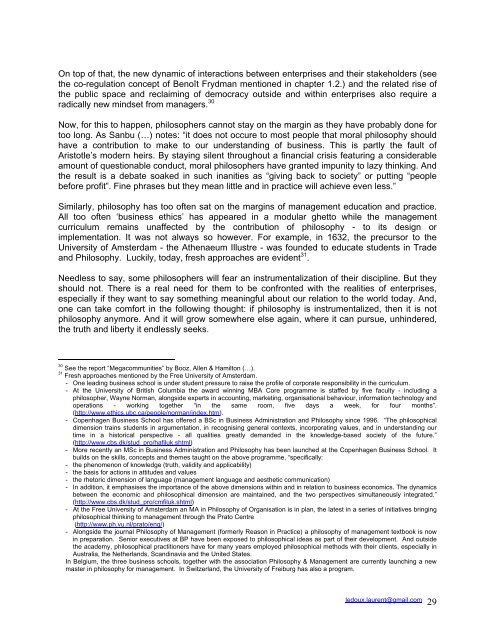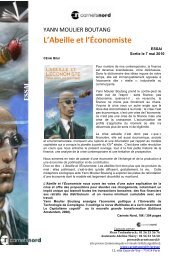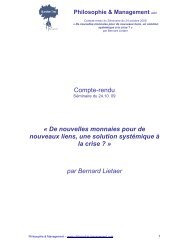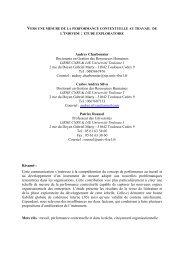Philosophy: The Managers - Philosophie Management
Philosophy: The Managers - Philosophie Management
Philosophy: The Managers - Philosophie Management
Create successful ePaper yourself
Turn your PDF publications into a flip-book with our unique Google optimized e-Paper software.
On top of that, the new dynamic of interactions between enterprises and their stakeholders (see<br />
the co-regulation concept of Benoît Frydman mentioned in chapter 1.2.) and the related rise of<br />
the public space and reclaiming of democracy outside and within enterprises also require a<br />
radically new mindset from managers. 30<br />
Now, for this to happen, philosophers cannot stay on the margin as they have probably done for<br />
too long. As Sanbu (…) notes: “it does not occure to most people that moral philosophy should<br />
have a contribution to make to our understanding of business. This is partly the fault of<br />
Aristotle’s modern heirs. By staying silent throughout a financial crisis featuring a considerable<br />
amount of questionable conduct, moral philosophers have granted impunity to lazy thinking. And<br />
the result is a debate soaked in such inanities as “giving back to society” or putting “people<br />
before profit”. Fine phrases but they mean little and in practice will achieve even less.”<br />
Similarly, philosophy has too often sat on the margins of management education and practice.<br />
All too often ‘business ethics’ has appeared in a modular ghetto while the management<br />
curriculum remains unaffected by the contribution of philosophy - to its design or<br />
implementation. It was not always so however. For example, in 1632, the precursor to the<br />
University of Amsterdam - the Athenaeum Illustre - was founded to educate students in Trade<br />
and <strong>Philosophy</strong>. Luckily, today, fresh approaches are evident 31 .<br />
Needless to say, some philosophers will fear an instrumentalization of their discipline. But they<br />
should not. <strong>The</strong>re is a real need for them to be confronted with the realities of enterprises,<br />
especially if they want to say something meaningful about our relation to the world today. And,<br />
one can take comfort in the following thought: if philosophy is instrumentalized, then it is not<br />
philosophy anymore. And it will grow somewhere else again, where it can pursue, unhindered,<br />
the truth and liberty it endlessly seeks.<br />
30<br />
See the report “Megacommunities” by Booz, Allen & Hamilton (…).<br />
31<br />
Fresh approaches mentioned by the Free University of Amsterdam.<br />
- One leading business school is under student pressure to raise the profile of corporate responsibility in the curriculum.<br />
- At the University of British Columbia the award winning MBA Core programme is staffed by five faculty - including a<br />
philosopher, Wayne Norman, alongside experts in accounting, marketing, organisational behaviour, information technology and<br />
operations - working together “in the same room, five days a week, for four months”.<br />
(http://www.ethics.ubc.ca/people/norman/index.htm).<br />
- Copenhagen Business School has offered a BSc in Business Administration and <strong>Philosophy</strong> since 1996. “<strong>The</strong> philosophical<br />
dimension trains students in argumentation, in recognising general contexts, incorporating values, and in understanding our<br />
time in a historical perspective - all qualities greatly demanded in the knowledge-based society of the future.”<br />
(http://www.cbs.dk/stud_pro/hafiluk.shtml)<br />
- More recently an MSc in Business Administration and <strong>Philosophy</strong> has been launched at the Copenhagen Business School. It<br />
builds on the skills, concepts and themes taught on the above programme, “specifically:<br />
- the phenomenon of knowledge (truth, validity and applicability)<br />
- the basis for actions in attitudes and values<br />
- the rhetoric dimension of language (management language and aesthetic communication)<br />
- In addition, it emphasises the importance of the above dimensions within and in relation to business economics. <strong>The</strong> dynamics<br />
between the economic and philosophical dimension are maintained, and the two perspectives simultaneously integrated.”<br />
(http://www.cbs.dk/stud_pro/cmfiluk.shtml)<br />
- At the Free University of Amsterdam an MA in <strong>Philosophy</strong> of Organisation is in plan, the latest in a series of initiatives bringing<br />
philosophical thinking to management through the Prato Centre<br />
(http://www.ph.vu.nl/prato/eng/)<br />
- Alongside the journal <strong>Philosophy</strong> of <strong>Management</strong> (formerly Reason in Practice) a philosophy of management textbook is now<br />
in preparation. Senior executives at BP have been exposed to philosophical ideas as part of their development. And outside<br />
the academy, philosophical practitioners have for many years employed philosophical methods with their clients, especially in<br />
Australia, the Netherlands, Scandinavia and the United States.<br />
In Belgium, the three business schools, together with the association <strong>Philosophy</strong> & <strong>Management</strong> are currently launching a new<br />
master in philosophy for management. In Switzerland, the University of Freiburg has also a program.<br />
ledoux.laurent@gmail.com<br />
29
















